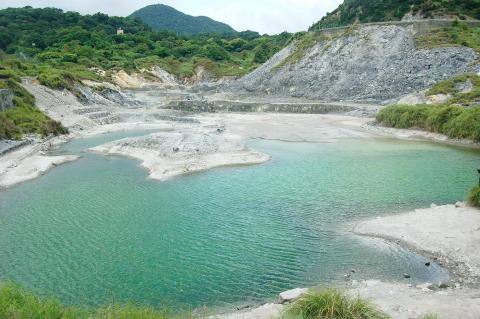Dubbed a “hot spring village,” Taipei’s Beitou District (北投) is renowned for its many hot spring hotels and resorts, mostly centered around the Xinbeitou MRT Station and Beitou Park.
The most common type of hot spring in the area is the white sulfur hot spring, which hails from the Liuhuangku Geothermal Scenic Area, a 16-hectare mountain-surrounded area southwest of the Yangmingshan National Park, followed by the blue sulfur hot springs emerging from the Thermal Valley, or Hell Valley, and iron sulfur hot springs.
According to locals, the Liuhuangku scenic area, or Sulfur Valley, was originally a mining area for sulfur minerals that were shipped mainly to China for the manufacturing of gunpowder. It was not until the Japanese colonial era that the hot springs industry flourished in the area.

Photo: Huang Chi-hao, Taipei Times
Formation of the white sulfur springs is the result of oxidation of vaporized sulfur, strata minerals on the earth’s surface, and surface water, which subsequently condenses into acidic water after making contact with cold surfaces.
The temperature of the blue sulfur hot springs from Hell Valley, which contain a wealth of sulfate minerals, can reach up to 90°C — the highest among hot springs located within the Tatun volcano group — and the spring in Beitou district is one of only two of their kind in the world.
This type of hot spring is formed by the heating of underground water by volcanic lava that mixes with surface water.

Alain Robert, known as the "French Spider-Man," praised Alex Honnold as exceptionally well-prepared after the US climber completed a free solo ascent of Taipei 101 yesterday. Robert said Honnold's ascent of the 508m-tall skyscraper in just more than one-and-a-half hours without using safety ropes or equipment was a remarkable achievement. "This is my life," he said in an interview conducted in French, adding that he liked the feeling of being "on the edge of danger." The 63-year-old Frenchman climbed Taipei 101 using ropes in December 2004, taking about four hours to reach the top. On a one-to-10 scale of difficulty, Robert said Taipei 101

Nipah virus infection is to be officially listed as a category 5 notifiable infectious disease in Taiwan in March, while clinical treatment guidelines are being formulated, the Centers for Disease Control (CDC) said yesterday. With Nipah infections being reported in other countries and considering its relatively high fatality rate, the centers on Jan. 16 announced that it would be listed as a notifiable infectious disease to bolster the nation’s systematic early warning system and increase public awareness, the CDC said. Bangladesh reported four fatal cases last year in separate districts, with three linked to raw date palm sap consumption, CDC Epidemic Intelligence

Two Taiwanese prosecutors were questioned by Chinese security personnel at their hotel during a trip to China’s Henan Province this month, the Mainland Affairs Council (MAC) said yesterday. The officers had personal information on the prosecutors, including “when they were assigned to their posts, their work locations and job titles,” MAC Deputy Minister and spokesman Liang Wen-chieh (梁文傑) said. On top of asking about their agencies and positions, the officers also questioned the prosecutors about the Cross-Strait Joint Crime-Fighting and Judicial Mutual Assistance Agreement, a pact that serves as the framework for Taiwan-China cooperation on combating crime and providing judicial assistance, Liang

US climber Alex Honnold left Taiwan this morning a day after completing a free-solo ascent of Taipei 101, a feat that drew cheers from onlookers and gained widespread international attention. Honnold yesterday scaled the 101-story skyscraper without a rope or safety harness. The climb — the highest urban free-solo ascent ever attempted — took just more than 90 minutes and was streamed live on Netflix. It was covered by major international news outlets including CNN, the New York Times, the Guardian and the Wall Street Journal. As Honnold prepared to leave Taiwan today, he attracted a crowd when he and his wife, Sanni,